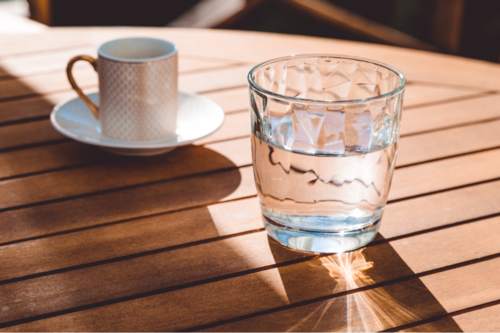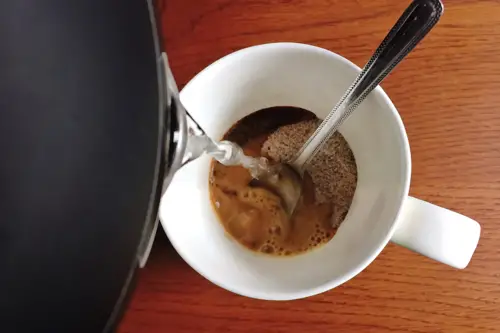One of the indispensable elements for the preparation of any type of coffee is water. The importance of water in the preparation of coffee is as important as the choice and preparation of the coffee. The quality of the water determines the percentage of appreciation of the coffee’s notes and qualities. This is why water adds to or detracts from the value of the coffee.
How to determine the best water for your coffee?
There are several parameters that must be considered to determine the quality of the water with which you will prepare your coffee. The ones that are most important in coffee brewing are the pH, the taste and colour, the alkalinity of the water and the TDS. These may seem like very complex factors to determine individually, but there is a quick and easy solution to avoid checking each of the above factors.

By using filtered water or bottled mineral water to prepare your coffee, you reduce the possibility of the water detracting from the properties of the beverage. Conversely, good quality water ensures that the acidity of the coffee is not neutralised or accentuated, as poor quality water contains calcium or other minerals that are responsible for this variation.
Water alters the coffee in the extraction of different components in the beverage. Approximately 30% of the coffee is water-soluble, and of this percentage, 20% is responsible for the sweetness and acidity. The remaining 8% is accounted for by bitter and astringent components.
Contents of a cup of coffee
- Water: 98.75%
- Polymers: 50%
- Minerals: 6%
- Aliphatic acids: 14%
- Sucrose: 6%
- Monosaccharides: 4%
- Chlorogenic acid: 6%
- Trigonelline: 3%
- Caffeine: 7%
What is water hardness?
According to the Specialty Coffee Association (SCA), water hardness should be between 17 and 85 milligrams per litre of water. This is in order to obtain a higher quality coffee extraction. As mentioned above, water can neutralise the acidity of the coffee or its aromatic components.
On the other hand, excess limescale can affect the coffee machine in which you brew your coffee. Similarly, the presence of other minerals such as sodium, sulphur or chlorine in the water can affect the body, aroma and consistency of the crema. Water hardness can also be expressed by measuring the concentration of calcium carbonate (CaCO3) in milligrams per litre as follows, according to the Merk scale.
- 0 to 79 milligrams CaCO3/l is very soft water.
- 80 to 149 milligrams CaCO3/l is soft water.
- 150 to 329 milligrams CaCO3/l, is semi-hard water.
- 330 to 549 milligrams CaCO3/l, is considered hard water.
- More than 550 milligrams CaCO3/l, would be very hard water.
It is important to note that hard and very hard water not only diminishes the quality of coffee but can also affect the functioning of coffee machines, especially in their pipes due to excessive limescale. To know the level of hardness of the water in your home, you can introduce a test strip in a glass of water and depending on the colour obtained; you will know the type of water you have at home.

What is TDS?
TDS refers to the total dissolved solids in water, an important measure of water quality. It is expressed in units of milligrams per unit volume of water, either in litres or milligrams or in parts per million (ppm). TDS encompasses inorganic salts and trace amounts dissolved in water. Its main components are sodium, potassium, magnesium and calcium cations—also, bicarbonate, chloride, nitrate, carbonate and sulphate anions.
In general, tap water or mineral water has a TDS between 100 and 200 mg/l. In areas where the water has a high concentration of minerals, the values may be higher. The importance of water in coffee preparation can be determined when the total TDS in a cup of coffee is +/- 150 ppm.
Acidity, flavours and odours of water
Another aspect that determines the importance of water in coffee brewing is the concentration of hydrogen ions in the water. Therefore, the right pH for a good cup of coffee is 6.5 to 7.5. The closer the values are to 7, the better the acidity of the coffee. As far as envelopes and odours are concerned, the water should be tasteless and colourless. This ensures that the amount of possible elements such as chlorine or heavy metals is kept to a minimum.
As you can see, there are several aspects to consider in order to obtain the best possible cup of coffee. Water plays a fundamental role in its preparation, either manually or through coffee machines. The most important thing is to know the Ph values and the hardness of the water so that you can use the best quality water in your coffee preparations.
